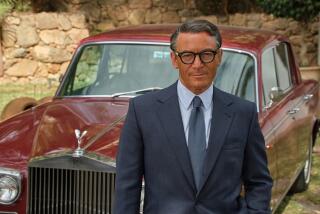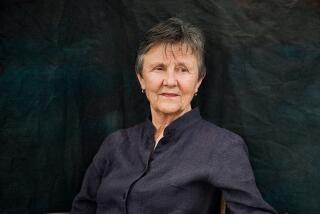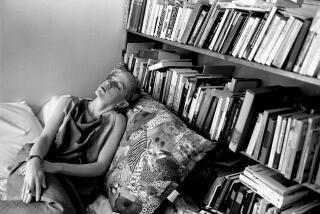Truth Catches Up With ‘Accused’ Storyteller
- Share via
LONDON — He is a best-selling novelist, a disgraced member of the House of Lords and an actor in the brief West End run of his own play, appropriately called “The Accused.” On Thursday, Jeffrey Archer added perjurer to his list of credits when a jury found him guilty of lying during a 1987 libel trial.
Archer, 61, was convicted on four counts of perjury and obstruction of justice for his actions during the suit he brought against the Daily Star after the newspaper reported that he had hired a prostitute. Archer won that trial, netting about $700,000 from the tabloid.
But he lost this round. He was sentenced to four years in prison and ordered to pay $245,000 in costs. The Star said it will bring a civil suit to recover the rest of the money, plus interest. Archer’s lawyer said his client will appeal.
“These charges represent as serious an offense of perjury as I have had experience of and have been able to find in the books,” Justice Francis Potts said.
He said Archer must serve at least two years of the sentence--more than enough time, noted friend and foe alike, for the man often called “the author of his own misfortune” to churn out another crime novel.
Not that any book could beat the story of Archer’s roller-coaster career and tantalizing trial: The boy dubbed “Tuppence” by his mother grew up to be a self-made millionaire and confidant of former Prime Minister Margaret Thatcher, but with an Oscar Wilde propensity to court disaster.
His six-week trial began shortly after the accidental death of the prostitute with whom he allegedly had a relationship, witnessed betrayal by the friend who had provided Archer with a false alibi in the libel case, and ended with the death of the defendant’s elderly mother.
Archer refused to take the stand in his own defense, relying on his elegant wife, Mary, a Cambridge University scientist, to do so instead. The strategy didn’t work, and the British airwaves crackled with news of the rogue lord’s conviction.
“He’s a tragedy. He’s a personal tragedy and a political tragedy,” said Bernard Ingham, who served as Thatcher’s spokesman.
“He actually liked danger and exposure,” political commentator Matthew Parris told British television. “If things went quiet for a while, he went straight back to the fire. He was always going to be burned.”
Unlike those declaring Archer’s public obituary, Parris refused to write him off. “Jeffrey Archer’s career has been ruined at least three times before,” Parris said. “Until there’s a stake driven through his heart, I will not say he won’t come back.”
The jury deliberated for four days before convicting the author of novels such as “Kane and Abel” and “Twelve Red Herrings” on the basis of testimony from former friends and allies who had been drawn into his case.
Archer’s friend Ted Francis testified during the 1987 trial that they had dined together the night that the author was allegedly with the prostitute, providing Archer with the alibi that helped him win the suit.
But Francis later grew disillusioned with Archer and went to the press to recant. Archer countered that the alibi was a cover for a dinner with a close woman friend, but the scandal forced him to withdraw as the Conservative Party candidate for mayor of London and led to his expulsion from the party.
The court heard a secretly recorded telephone conversation in which Francis and Archer discussed the cooked-up alibi. The court also heard from one of Archer’s former secretaries, Angela Peppiatt, who said he had urged her to forge an appointments diary with false information, which was used in the libel trial.
The prostitute Archer allegedly patronized, Monica Coghlan, was killed April 27 when she was struck by a stolen car driven by a fleeing robbery suspect in northwestern England. She had not been called as a witness. The driver has been jailed.
The jury decided that Archer was guilty of asking Francis to provide the false alibi, using a fake date book and lying under oath during the 1987 libel trial. The panel also said he perjured himself in an affidavit to the High Court, but it cleared him of one count of obstructing justice related to another diary used in the libel case.
Francis was cleared of a single count of perverting the course of justice.
Archer was taken from court to the high-security Belmarsh Prison in southern London, while his friends and critics weighed in.
“I am deeply, deeply sorry at the outcome,” said former Prime Minister John Major. “I hope at this difficult time everyone will also remember the many kind and generous things Jeffrey has done.”
But Peter Hill, editor of the Daily Star, was less forgiving: “Jeffrey Archer is a liar. He’s been a liar all his life.”
“Kane and Abel,” Archer’s third novel, was made into a television miniseries in the United States and transformed the author into a publishing powerhouse. In 1990, he signed a three-book deal with HarperCollins for as much as $30 million.
But falsehoods have haunted him. A BBC television profile of him said Archer won a place to study at Oxford University by falsely claiming that he had a degree from a U.S. university. He ran track at Oxford but was sanctioned for jumping the starting gun.
His political career in the Conservative Party was cut short once by his involvement in a less-than-reputable investment scheme. He bounced back to become deputy chairman and a tireless fund-raiser for the party. In return, he was honored with a life peerage in 1992, becoming Lord Archer of Weston-Super-Mare. He keeps his title despite the conviction.
In “The Accused,” which ran just before his trial, Archer played a doctor accused of murdering his wife. At the end of each performance, the audience was asked to vote on whether his character was guilty.
At the end of his own trial, Britons seemed to have little doubt that the storyteller is guilty of perjury. What many wondered was whether the perjurer recognizes a story when he tells one.
“I would like to know,” said Parris, the political columnist for the Times of London newspaper and the Spectator magazine, “does he conceal the truth from his private self?”
More to Read
The biggest entertainment stories
Get our big stories about Hollywood, film, television, music, arts, culture and more right in your inbox as soon as they publish.
You may occasionally receive promotional content from the Los Angeles Times.










